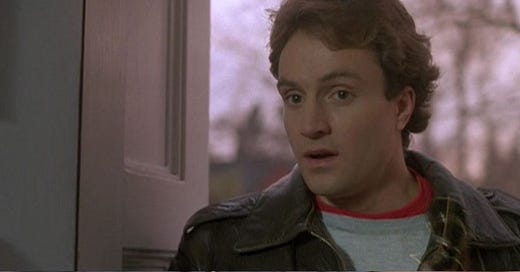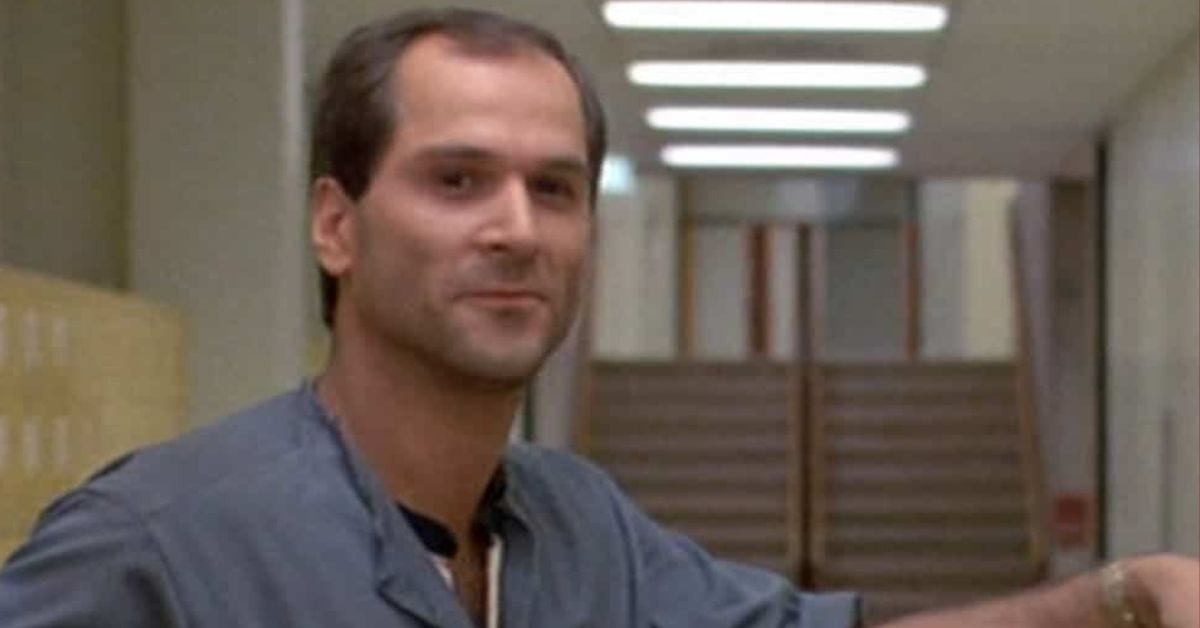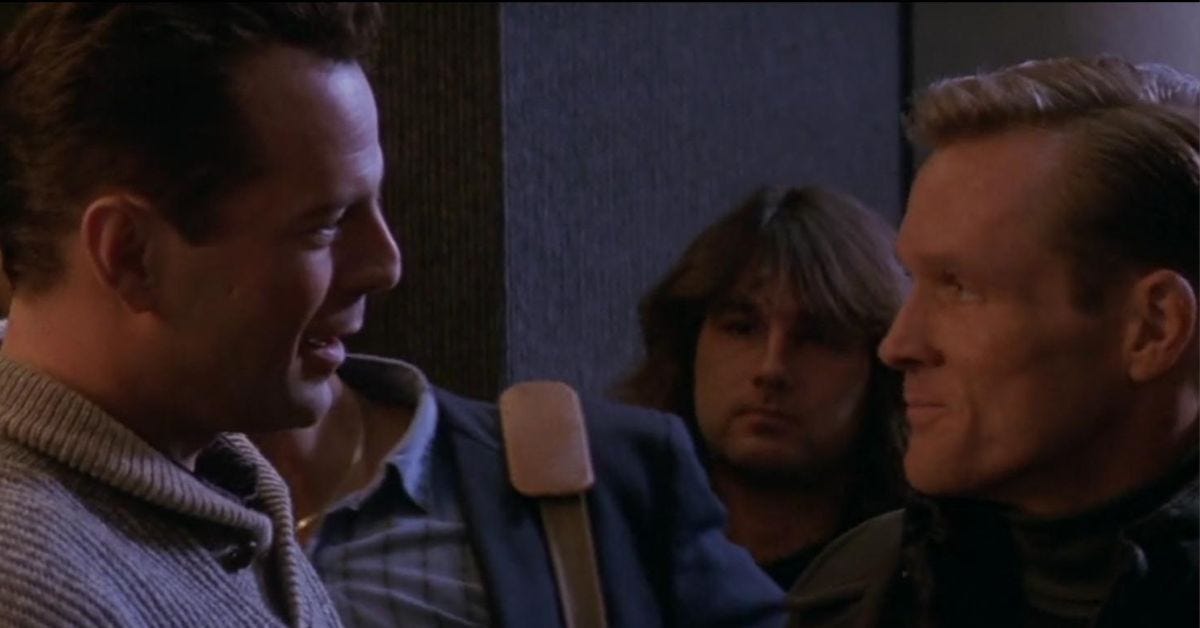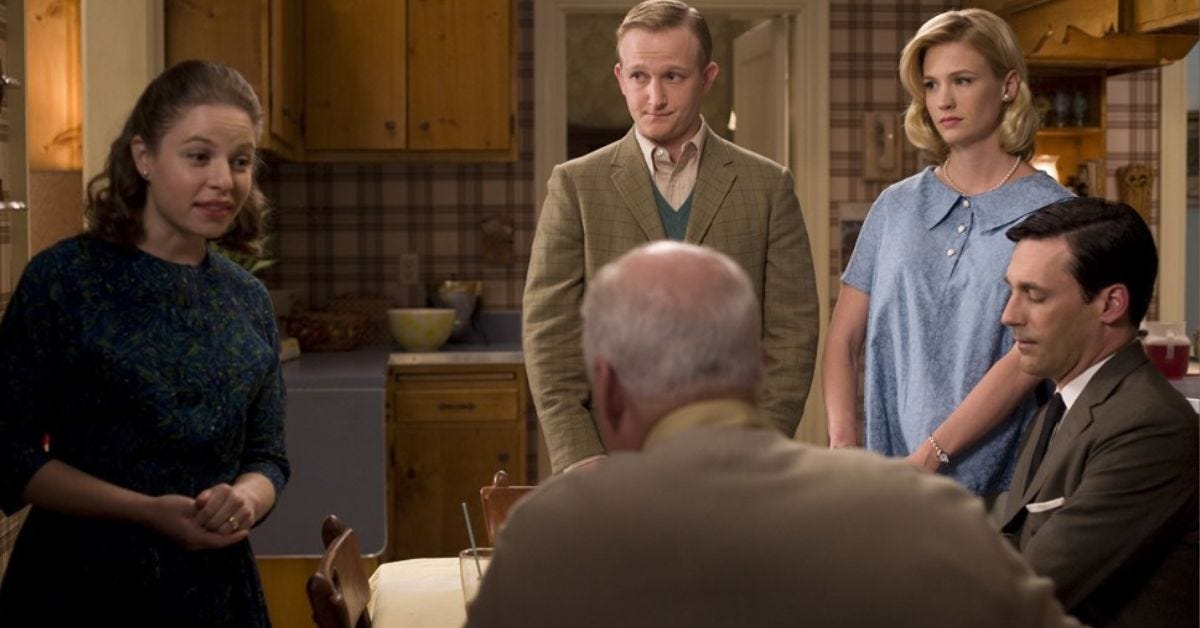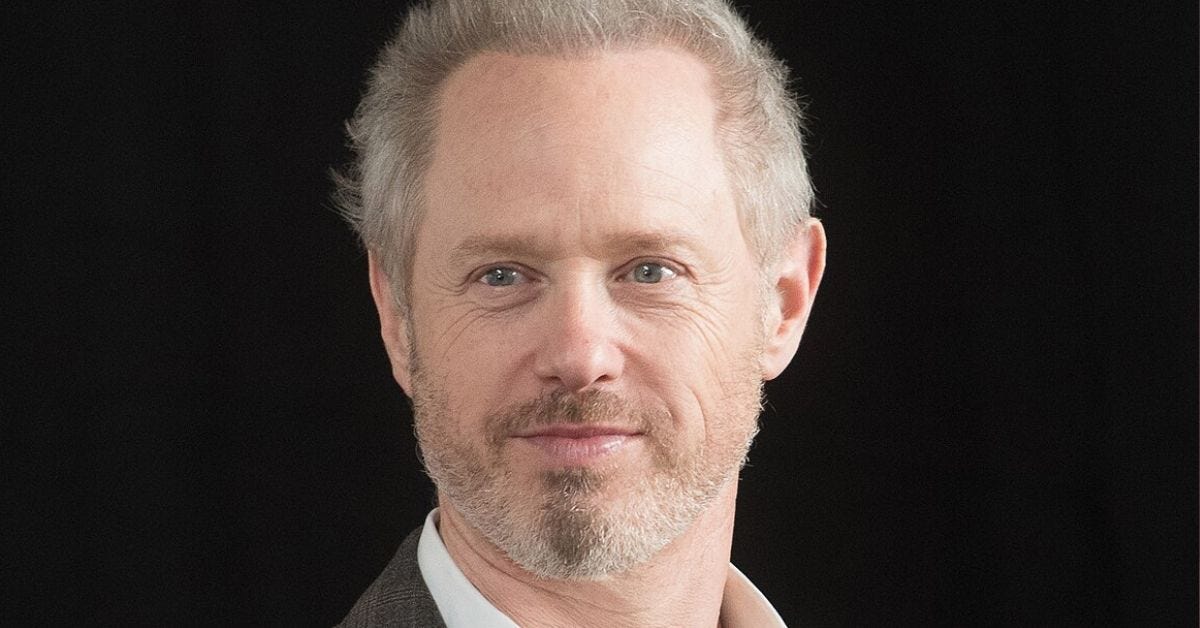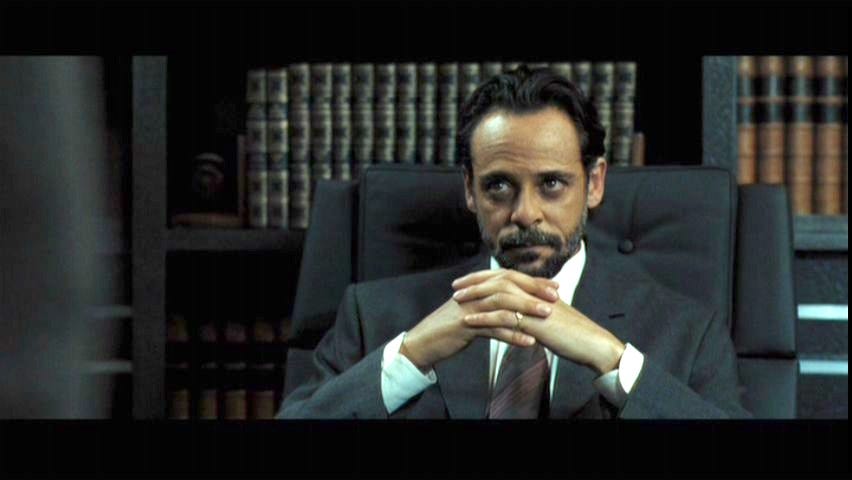Random Reminiscing: Looking Back at My Many Random Roles Interviews (Part 20 of Quite a Few)
Featuring anecdotes from John Kapelos, Bradley Whitford, William Sadler, Eric Ladin, Raphael Sbarge, Alexander Siddig
Back in 2021, when I celebrated the 10th anniversary of my first Random Roles, I was feeling a tad nostalgic, so I decided that I wanted to start looking back at my contributions to this A.V. Club feature, since it’s the portion of my freelance career of which I’m most proud.
If you accidentally missed the previous part of this reminiscing (and you may have, because it was in 2021!), you can check it out by clicking right here…and if you missed the part before that, well, each installment has a link to the previous installment in the intro, so just keep on clicking back until you’ve read ‘em all!
If you’re all up to date, though, then for heaven’s sake, why are you wasting time with this intro? Just dive right in!
John Kapelos:
SCTV (1978)—Extra
How did you end up at Second City? Did you just have the idea to audition, or did someone suggest it to you?
John Kapelos: I was in the University Of Ottawa and saw the road company of Second City, and I really fell in love with that. And then the next day, I fell down some stairs and broke my arm and ended up dropping out of university, hitchhiking to the west coast of Canada, and working on an oil rig for about eight months. I sort of had a falling-out with my family—I was rebellious—and I ended up working at a record store, pricing albums. I remember pricing Steve Martin’s Let’s Get Small—like, thousands of them—in this shop in Vancouver, and I had a crummy little apartment. It was a bad time. Fun adventures, but also sort of horrible.
And then when I came back to Toronto in May of 1978 after having sort of a rapprochement with my father and mother—they weren’t too pleased that I did this whole sojourn out West—I had this big meeting with my dad where I said, “I want to be an actor,” and he said, “Okay.” My dad was a lovely guy. I had great parents. But he was a conservative shopkeeper, and he said, “Look, I don’t know how to help you as an actor, but if you want to be an actor, give it a go for a year. Get a job. And if you don’t get a job, then we’re going to reevaluate and you’re going to go back to school.” And I thought that was a fair thing.
The next night, I was in Toronto, I’d gotten this crummy apartment, and I went to Second City, because I’d remembered the touring company, and the improvisations were free. Well, that night, John Candy, Martin Short, Catherine O’Hara, Gene Levy, a guy named Peter Torokvei, and Steve Kampmann, they did the improvs. And I think I went to the improvs for the next three months. Every night. And not only that, but I started doing workshops the following week, then I became friends with the actors backstage, after the show, at the bar. I had a revelation: “I want to do Second City.” This happened very rapidly. They were shooting SCTV, and I volunteered to become an extra, because they took kids from the workshop, so you can see me in the early SCTVs. I steal water from John Candy, dressed as an Arab, in the Bob Hope Desert Classic, and all this stuff. I’m very young, but I’m in there. So that’s where I met the producer Bernie Sahlins.
My mom was an American, so when I was pricing records in Vancouver, I remember calling her up, saying, “Mom, can you help me get my U.S. citizenship?” So with that in mind, I met Bernie Sahlins and said, “I’d like to audition for Second City Chicago.” He said, “Are you ready, kid?” I said, “Yeah, I’m ready. I’m ready!” So he said, “I’ll give you a call.” So I gave him my phone number, and he never called! So I called my parents a couple of weeks later and said, “I need to take a Greyhound bus to Chicago, because I’ve got a job offer at Second City.” Which was entirely an untruth. [Laughs.] So my dad—God rest his soul, I love him—gave me his credit card, and I took a Greyhound bus to Chicago and surprised the hell out of the Second City people, including Bernie.
But they said, “Okay, you can audition,” and the story’s much longer than this, but basically I auditioned with this wonderful guy named Mike Hagerty—we’re friends to this day—and they offered me a job. So I called my mother up, and I said, “Hey, Mom, I got the job!” And she said, “I thought they already offered it to you.” And I said, “Uh, yeah, but I had to sort of secure it…?” And she said, “Well, there’s an envelope here from the U.S. Consulate.” I said, “Open it!” It was my passport. Goodbye, Canada. Hello, world! And Linda Ronstadt’s Living In The U.S.A. was No. 1 the day I moved to the U.S.! [Laughs.] I never looked back. You know, John Candy was a huge influence on me and a loving, wonderful teacher. A great dude. I miss him terribly.
You mentioned him earlier, but how influential was Del Close for you?
Del Close by that time was more myth than man. And he was great, but he had a difficult time at Second City. He and I had got along personally, and I learned a lot from him, but I’ve gotta say that he, uh… [Long pause.] You know, I can’t exaggerate: There were things about him at that time where people were having some difficulty about him. And it was perhaps mostly because of his proclivities. And we’ll leave it at that.
But Bernie Sahlins, the producer of Second City, was a big influence on me. And Fred Kaz. And Joyce Sloane, another producer of Second City, was a huge protector and a different sort of influence, helping with my career and career guidance. And Del was in there. But I have to say that Bernie was a big influence. And Fred was as well, because I was and am very musical. In fact, we’re mixing “Don’t You (Forget About Me)” right now. I covered it for my new album. So Fred’s still in my life on a daily basis. They all are.
I remember Del saying to me backstage one day during the summer of the big Dallas cliffhanger, “I don’t know who shot J.R., but I know who shot up J.R.” And I was, like, “Oh, great, Del, thanks.” Because he and Larry Hagman used to do heroin when they did The Nervous Set off-Broadway in 1959. I was, like, “Oh, really? I want to hear this?” [Laughs.] The first day of workshops… I’m, like, 21, and they made us do workshops with Del. He goes to the edge of the stage, he takes off his clothes, and he’s there with this brown underwear on that used to be white, and his body is like a moon landscape with pock marks from where he shot heroin. And he teetered at the edge of the stage, and he said, “This… is my track suit.” And like Jesus Christ at the end, he spreads his arms out, and then he does a dead drop off the stage. And we all scramble to catch him, which we did. We’re all holding him by pieces of skin and hair, and as he’s, like, an eighth of an inch from smashing his head on a table, we caught him. And he looks around, with everything hanging out, and says, “Now… I can trust you.” Yeah, okay, Del. [Narrating.] “Dear Mom and Dad, today I met a member of the counterculture…”
You know, to date, I have never been let down by asking anyone about Del Close.
[Laughs.] Oh, I’ve got more and more stories about Del, believe me. He was, uh, certainly somebody you could react to.
Bradley Whitford:
Adventures In Babysitting (1987)—“Mike”
Revenge Of The Nerds II: Nerds In Paradise (1987)—“Roger”
Bradley Whitford: That was when I was playing yuppie scum. [Laughs.] That was my wheelhouse: yuppie scum. Adventures In Babysitting—I remember I had a huge crush on Lisa Shue, and… that was Chris Columbus’ first movie, right? I think he’d sold some scripts, but it was the first time he’d directed. He’s one of the sweetest guys on the planet, so that was a really fun experience. But, yeah, I kind of got into this jerk mode, and right around that time I showed incredible range by doing Revenge Of The Nerds II: Nerds In Paradise, where I showed I could not only play an asshole at home but also one who was on vacation, which… was really, I’m sure, moving for people to see.
It’s no wonder you’ve made it as far as you have in your career.
Actually, I’ll tell you something funny. I was in New York after Adventures In Babysitting—I’d been playing all these jerks—and it was one of the first times anybody recognized me. A homeless guy said, “Hey, you’re that guy! You’re in those movies, right?” And I’m like Jeff Daniels in Purple Rose Of Cairo. “Oh, yeah! Yeah, I am!” And the guy goes, “Yeah, why do you always play assholes?” [Laughs.] I think I called my agent and said something like, “Is that a problem? Should I worry about playing an asshole all the time? Could that damage my career?” And my agent said, “You don’t have a career to damage.” Which hurt at the time, but that’s the kind of honesty you need.
But I’ll tell you something weird: were it not for playing one of those jerks, I would not have met Aaron Sorkin. If I had not done Revenge Of The Nerds II: Nerds In Paradise —and, please, if you’re gonna reference it, use the whole title—I never would’ve met Tim Busfield, who then went into A Few Good Men and, when they were replacing someone, said to Aaron, “You should have this guy read for you.” So if I hadn’t done Revenge Of The Nerds II: Nerds In Paradise, I never would’ve gotten to do The West Wing.
William Sadler:
Tales From The Crypt (1989)—“Niles Talbot”
Die Hard 2 (1990)—“Col. Stuart”
William Sadler: Die Hard 2 was – like The Shawshank Redemption – a result of doing the very first episode of Tales From The Crypt. Die Hard 2 was produced by Joel Silver, who was also one of the producers on the Tales From The Crypt series, so a great portion of my career flowed from one particular moment when I came in to audition for that episode. But I actually came in to audition for the cop at the end who arrests Talbot and says, “You have the right to remain silent. Anything you say, blah blah blah…” And at the end of the audition, I asked, (casting director) Karen Rea, “What’s up with the role of Talbot, the lead?” And she said, “Oh, they want a star. They need a star for that. They’re gonna get [John] Malkovich or Chris Walken or somebody. They need a name for that.”
So I left, and I got halfway across the parking lot, and she stuck her head out the window of the Silver building, and she said, “Bill! Bill! Come back!” She handed me the sides and said, “Come back on Monday, black out your teeth and grease your hair, and I’ll put you on tape and show it to them. What have we got to lose?” So I did. I came back on Monday and did the audition, and Walter Hill loved it. I worked with him again subsequently. In fact, the four producers on the show were Joel Silver, Dick Donner, Bob Zemeckis, and Walter Hill, and I worked with all of them subsequently. So it was just this remarkable little moment in my career where I could’ve so easily just left. If I hadn’t asked, “What’s up with the role of Talbot?” I would’ve had a different career.
In regard to Die Hard 2, you certainly make a big impression with your introduction, doing naked tai chi.
Why, thank you. [Laughs.]
Was it in the script that you’d be fully unclothed for that reveal?
Uh, no. I didn’t learn that until I got there for the costume fitting.
Or lack thereof?
You’re absolutely right! [Laughs.] I said, “What am I wearing in that scene?” We tried on everything else, and then Renny [Harlin] said, “Actually, I was thinking you would be nude.” And I said, “Well, if you push that scene off until the end of the movie and get me in the gym, I’ll see what I can do.”
Eric Ladin:
Mad Men (2008-2009)—“William Hofstadt”
Eric Ladin: One of my favorites. When I auditioned for Mad Men… It was Mad Men, but it wasn’t Mad Men, if you know what I mean. Season one had happened, but I had not watched season one. I remember very vividly having to audition for Mad Men, at L.A. Center Studios downtown. It was the dead of summer, and it was 105 degrees. I was in a wool suit, because I needed to wear a suit to this audition, and you had to walk, like, a mile to get there from where you parked. I was so irritated. And then by the time I got there, I was being such a prima donna for no reason whatsoever. I remember getting there and going, “Do I even want to audition for this? What is this show? It’s probably not even that great.” [Laughs.]
I waited for 45 minutes or an hour, and then of course I went in and met Matt Weiner and had a great time with him, and I ended up getting the show. And I thank my stars that I didn’t become an idiot and walk out because it was taking too long and I was too hot in my wool suit. [Laughs.] But it was such a fun role. I mean, to be able to be part of a show that I consider one of the most influential television shows in the history of television… I really feel that Mad Men broke the mold and paved the way for cable television drama. And where we are right now, in what people like to consider the golden age of TV, I look back and point to Mad Men at AMC. AMC, who was known for playing old movies, decided to take a leap and go into scripted television. And now, however many years later, we’ve got all these cable networks who are doing the same thing. And it’s because of Mad Men!
They took a chance and let them tell this story in a way that never would’ve lasted on network television, and they did it beautifully, and they did it people who weren’t stars, with actors who were great talents. It’s really phenomenal. I’m thrilled that I was able to play a part in it, and William was a lofty little punk. But I had a great time with Jon, a great time with January, and with Matt Weiner. My only wish is that I wish I would’ve gotten to do more, because I love that period. I loved wearing the clothes, I loved everything about it.
I’m not going to tell you that I necessarily see a sibling resemblance between you and January Jones.
[Mock huffiness.] So I’m not as beautiful as January Jones? Is that what you’re saying?
I’m just saying that the resemblance eludes me.
[Laughs.] All I know is that I basically spent my days at the time fielding calls from my friends from back home. “Dude, is January single? Can you, like, set me up? Can I come to set? Does she look as pretty in person?” Basically, nobody wanted to know anything about my work or about me or if I had fun. It was essentially just, “So what’s January’s deal?”
Raphael Sbarge:
Sesame Street (1969)—Actor
Normally this is where I’d ask you how you found your way into acting as a profession in the first place, but given your parentage, it seems like you came by it honestly.
Raphael Sbarge: Yeah, Mom’s a costume designer in the theater, my dad’s a playwright, they both met at Yale as students, and then my dad went on to be a documentary filmmaker and wrote a book on architecture; my mother wrote a book on the history of costume. She was also a professor at Yale, Tulane, and NYU, and she’s done lots and lots of shows on Broadway, etc. So I really sort of grew up backstage, very much “raised in a trunk,” as they say, and I have some wonderful childhood memories of being with the actors backstage and just hanging out. They’d kind of take me under their wing and hang out with me, and it sort of felt like running away with the circus.
There was something magical about hanging out backstage, looking from the wings into the lights. Seeing all that, it looked like magic to me. My mother worked very hard in the theater, which was difficult and took a lot of patience. Being a costume designer for the theater is not a high-paying gig. [Laughs.] But she was—miraculously—able to support herself just as a costume designer for years, and then as a teacher. But just because we were living in the Lower East Side in a commune in the ’60s, it turned out that we were geographically close to where they were then shooting Sesame Street, so I was on Sesame Street when I was, like, 4-and-a-half.
Wow. I didn’t realize that.
[Laughs.] Yeah! I did a bunch of episodes of Sesame Street, which is wacky to think about now. At the time… I mean, who knew it was going to be where it is now? But I have vivid memories of meeting Oscar and Big Bird, and Mr. Hooper sat me on a donkey and we talked about the differences between the donkey and a horse. Anyway, they offered me a contract, apparently, and my mother didn’t want to be a stage mother, so she decided to kind of say, “Look, if he’s going to do this, let him do it himself, because it’s too hard.” And she had a burgeoning career of her own at that point, so she didn’t want to be sitting backstage, so she turned it down. But I still ended up around a lot of theater, and when she was working at Yale, if they happened to need kids, I’d be in a show, so there were things like that.
And then when we moved from Connecticut back to New York City, at that point, I was 13, and I decided I wanted to be an actor, so I called an actress friend and said, “What do I do?” And she said, “Well, here’s my agent’s phone number. Give him a call!” So I said, “Okay!” And I bicycled over to the East Side. I did this all on my own, because in New York you can do it on your own. There are no child labor laws, so you literally can do it on your own! [Laughs.] I just had to bring the contract home to be signed by my parents. But with my bus pass in hand… Obviously, I was a very precocious kid, and I just kind of went out and did it. And I got my Screen Actors Guild card almost immediately, and then I got my Equity card at 14 or 15. I was doing a play at the Public [Theater], and just started training and studying in New York City.
I’ve had so many friends who’ve been in the business and gone through so many iterations, but—astonishingly—I’ve somehow been able to carve out a career where I’ve just been able to keep working, I’ve gone through different physical changes and still been able to keep working. It’s just such a difficult business, and I’m painfully aware of that. So, yeah, there’s not a day that I’m not grateful for the fact that I’ve been able to keep working.
You mentioned the Public Theater a minute ago. I’ve read that your first stage role was actually in Joe Papp’s Shakespeare In The Park production of Henry IV, Part 1.
It was! And then I did another play at the Public, and I did a production of Hamlet that Joe Papp actually directed where I played multiple parts. It was pretty exciting to work with him.
The cast list for Henry IV, Part 1 is pretty crazy: John Goodman, Val Kilmer…
Yeah! And in Hamlet, Jimmy Smits was a spear carrier! [Laughs.] So those theater experiences were obviously pivotal in my trying to make some sense of what kind of actor I wanted to be, and Joe was very kind to me and gave me some tremendous opportunities. I went on Broadway for the first time when I was 16, with Faye Dunaway [in The Curse Of An Aching Heart] and had a lot of wonderful success in New York doing lots of different plays. And to that end, New York is still very much home. In fact, I have a place there. It’s the place where I got my start, and artistically and spiritually New York very much feels like home.
Alexander Siddig:
Doomsday (2008)—“John Hatcher”
Alexander Siddig: Oh, yeah! Written and directed by Neil Marshall, filmed in South Africa with Bob Hoskins! How cool! And also the first time I’d ever been in a movie with Malcolm [McDowell], my uncle. That’s true: That was the first time we ever worked together. Ironically, we didn’t meet each other on the movie! Which is the way movies go, isn’t it? He arrived as I left. I shot myself in the face and exited stage left. [Laughs.] It was part of a long list of deaths that I’ve had. I think I must be one of the record holders for an actor who dies on film. One of these days, someone’s going to have to make some kind of a greatest-hits of my deaths.
A super-cut?
Yeah! It’d go on for, like, 25 minutes, because I’ve died nearly 20 times, which is actually really hard to do, given that most actors spend their careers trying not to die on-screen. Apparently, it’s really bad luck! So I’m hoping I live forever, because I’ve tried it all. I’ve done ’em all. You’re not gonna surprise me, God! [Laughs.]
Do you have a Bob Hoskins story?
It would be unfair to come up with a story about him, because he was just such a sweet man. I mean, he really was.
Oh, it doesn’t have to be a bad story.
Oh, but I love bad stories! That’s what it’s all about! But Bob was just such a gorgeous gentleman. He was slightly like a little gnome. [Laughs.] But he was an adorable little gnome. And, you know, I watched The Long Good Friday and a number of movies he was in, and I just thought he was one of the coolest guys on the planet. He just had this way about him, and he was so much bigger on screen than he was in real life, which is a talent. He was just sweet. A gentleman. And he had this lovely lady with him, who I only vaguely remember because she was so discreet, so difficult to pin down. But she was obviously his rock. So there was some lovely picture that he invoked in me when he arrived in the mornings, and he was always sweet and always gentle.
In regard to your uncle, did you spend your youth watching him and just thinking, “This is what I want to be”?
To a degree, maybe I did, subliminally. I didn’t know it at the time. And I certainly didn’t know it when I started acting, because I started doing something else. I didn’t want to act. It was only when I made Syriana that I eventually went [Exhales loudly.] “Okay. I’m acting. I’ve got to confess that I am now officially acting for a career.” And as I said earlier when you asked me, I was over 40 at that point!
But Malcolm made some astonishing movies, like If… and one called Aces High, which really appealed to me as a kid, and O Lucky Man! The Lindsay Anderson stuff. I didn’t get to see A Clockwork Orange, because it was banned in British cinemas. I didn’t see it until much later, and I don’t think it travels through time as well as some of the other ones.
I guess what Malcolm did do for me, though, was deconstruct the mystique of acting. It wasn’t something that seemed unattainable, because there he was doing it. And I would see him quite often, because he was my mother’s brother. We wouldn’t meet at Christmas and stuff, but we would go on vacations together, and I got to know his wives and kids and all that. That’s really lovely. His kids are doing great stuff today. So he was a major force in my life.

